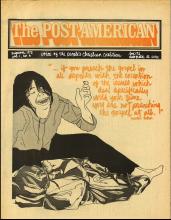Christians are admonished in scripture not “to become entangled in the affairs of this world,” not such an easy task when the god of this world is variously characterized as a sly serpent, a devouring lion, and a beast who would control all our “buying and selling.” This last apocalyptic picture is frighteningly similar to the evolving bureaucratic and economic structures of the
Alvin Toffler, in his best-selling Future Shock (Bantam 1970), gives the name “technocracy” to our country’s present-day megalithic monsters. He defines technocracy as 1) econocentric (its goal is economy, its means for reaching that goal is technology), 2) short-range (it disregards bad long-range effects, such as wasted manpower, pollution, and destruction of natural balances), and 3) undemocratic (decision-making, most of it non-delegated, is in the lands of very few men).
In each of these three aspects, super-industrialism (another name for technocracy) exploits the individual man and woman — especially the woman. Economically, the gap is widening between the incomes of working men and working women. Also, short-range planning in big-business continues to postpone the development of day-care centers and other institutions that would ease the pressures on working women. And increasing bureaucracy is reducing the already small percentage of women among industrial decision makers.
Many see no cause to even consider these three points as they relate to women; they would rather rest on that time-honored but short-sighted sentiment: “a woman’s place is in the home.”
Read the Full Article

